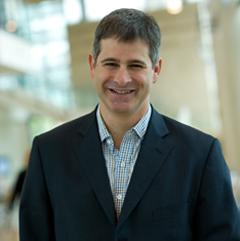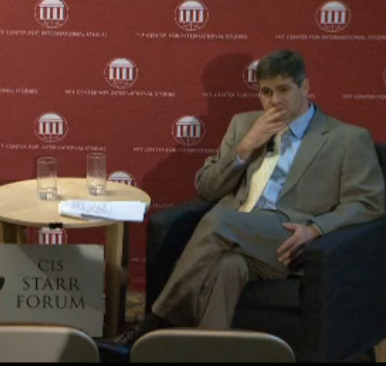
Chappell Lawson is associate professor of political science at MIT and director of the MIT International Science and Technology Initiatives (MISTI).
précis: Earlier this year, you returned from acting as the Executive Director of Policy and Planning, and Senior Advisor to the Commissioner, at US Customs and Border Protection. What were some of your main responsibilities and accomplishments?
CL: Most of the things that I feel good about fall under the rubric of "collaborative border management"—the notion that friendly countries which share a border should be able to cooperate very, very closely on issues of security and trade facilitation. Every "exit" at an American land border is a land-border "entry" for Mexico or Canada. As long as we have faith in the other's abilities and intentions, we should not need to stop people twice—once on each side—or make shippers fill out two different forms (one for each country). The challenges are obviously different on the northern border than the southern border, but there is ample room for better coordination in both.
Collaborative border management was not my idea—it was Commissioner Bersin's—but I'd like to think that I had a role in refining it and helping put it into practice.
précis: What was the biggest challenge of that job?
CL: Well, my family remained in Boston while I commuted back and forth to DC each week. Our second child was born halfway through my DC stint. Although I made it back for his delivery, I think I have used up all the hall passes my wife is likely to give me for the next twenty years.
In terms of the job itself, Customs and Border Protection is a law enforcement agency, which means that it is consciously insulated from political influence. There are fewer than a dozen political appointees in an organization of over 58,000 people; of the political appointees, only three or four of us were Senior Executive Service. Effecting change in standard operating procedures is not easy.
précis: How has your experience in Washington affected your research since returning to MIT?
CL: Alas, it hasn't. I have never really used any of the academic work I did in government, nor have I ever written anything scholarly based on my time in DC. I wonder if other people are better able to unify these worlds; for me, it has been like having two different careers—intertwined, but separate and distinct.
Your question encourages me to get cracking and find some way to leverage my experience in government as an academic.
précis: Did you learn anything about communicating your research to support policy makers?
CL: Well, I had worked in DC before, in the Clinton Administration. I already knew that most political appointees inhabit a frenetic world of pressing problems, to which they must respond as fast as possible, and this problem is compounded at an operational agency. To be relevant to senior officials, academics would have to know what issues were on their minds that week—which is awfully hard to do from outside. A year after leaving DC, most people have passed their "sell-by" date.
The ideas that catch fire in government don't get published in World Politics or theAmerican Political Science Review. I'd like to think that "collaborative border management" is a terrific new paradigm for policy wonks, but it doesn't lend itself to testable propositions.
In general, I believe that academics can have a bigger impact by trying to educate the next batch of policy-makers, so that these individuals have already thought through some of the issues they will confront—and identified the problems they want to solve—when they arrive in DC. That is an ambitious goal, even for the research in political science that purports to be "policy-oriented".

On Oct 20, Lawson spoke on Border Security in the 21st Century at a CIS Starr Forum. Joining Lawson was Alan Bersin, Commissioner of US Customs and Border Security. Watch video
précis: We have been seeing reports about the ongoing drug violence in Mexico. Will we see it spill over the border?
CL: El Paso is the safest midsize city in America. Ciudad Juarez is the most dangerous city in the Western Hemisphere. But in an aerial photograph, all you will see is a single urban area surrounded by desert, with a thin ribbon of river bisecting it.
So I would say spillover is very limited and likely to stay that way.
précis: You study Mexican democracy. How do you see the challenge of drug-related violence affecting the politics and institutions in Mexico?
CL: There are as many drug traffickers in the United States as there are in Mexico, and at least as much money from the drug trade on this side of the border as to the south. The difference is that trafficking in the US is fragmented into thousands of small organizations, none of which has the capacity to threaten the state. The principal goal of Mexico's current campaign is to break up the half-dozen cartels that control the great bulk of the traffic. The trouble is that fragmentation triggers competition among the cartels and thus violence. And, the scale of this violence has undermined support for the government and led some people in Mexico to question the strategy. The long-run solution is to build up Mexican law enforcement capacity. But that is a decade-long challenge, and it depends on the Mexican government making large-scale investments—which can only come from progressive income taxation.
précis: You recently took over as the director of MISTI. Could you tell us what you think MIT students gain from the experience? What do they contribute to their host countries?
CL: MISTI is a gem. I am really the beneficiary of all the work that Suzanne Berger, Dick Samuels, and others have done over the last 27 years.
Students who go abroad work in cutting-edge center engineering and science operations—either in research institutions or corporations. A student who graduates with a degree in Mechanical Engineering from MIT, who has spent a summer at a lab in Germany and another summer working on engineering issues at a company in Brazil, can write her own ticket. She looks distinctive. She looks like a future global leader.
précis: What are your plans for the program over the next few years?
CL: My goal is to continue expanding the program and keep it on a solid financial base.



